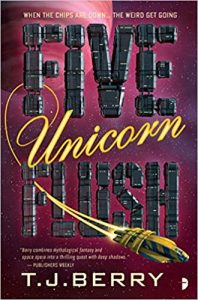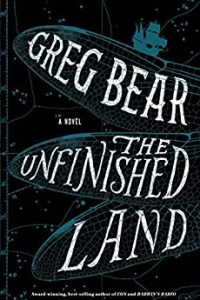Liz Bourke Reviews Five Unicorn Flush by T.J. Berry
 Five Unicorn Flush, T.J. Berry (Angry Robot US 978-0-85766-783-0, $12.99, 314pp, tp) May 2019. Cover by Lee Gibbons.
Five Unicorn Flush, T.J. Berry (Angry Robot US 978-0-85766-783-0, $12.99, 314pp, tp) May 2019. Cover by Lee Gibbons.
T.J. Berry’s debut novel, Space Unicorn Blues, took place in a fantastical space opera world, one in which creatures from human mythology, possessing magical powers, live and struggle alongside humans. These beings are known as the Bala, and the totalitarian, genocidal human government known as the Reason went to war to subjugate them. When Space Unicorn Blues opened, the Bala are an exploited underclass, criminalised and surveilled, whose bodies and talents are in many cases literally used to power Reason technology.
Unicorn horn powers FTL travel, and Gary Cobalt, half-human, half-immortal-unicorn-Bala-prince, had spent most of his life hunted. Space Unicorn Blues was a whimsically grim romp through Reasonspace, as Gary strove to survive, in the company of Jenny Perata, a wheelchair-using queer Maori war veteran ex-Reason space captain, who once kept Gary prisoner and tortured him for his horn, and who now has made common cause with him and is trying to find her (arrested-and-disappeared) Bala wife, Kaila; and Ricky Tang, conwoman and hustler, who was on the run in Reasonspace for… well. Reasons. Space Unicorn Blues ended in a summit where the bizarre and powerful aliens known as the Pymmie rendered a judgement between humans and Bala – and abruptly yanked every Bala out of Reasonspace to deposit them on a previously uninhabited (and undeveloped) planet, well away from humans, and causing chaos in the Reason.
Five Unicorn Flush is Space Unicorn Blues‘s sequel, and it more than lives up to its appealing, energetically batshit predecessor. Reasonspace is in disarray. So are the Bala. On a pink planet without contraception or technology, Gary Cobalt is trying to build a relationship with his father and encourage the Bala people to make the best of their new circumstances. Many of his people aren’t really that hot on an exile from the only lives they’ve ever known, or building new lives without the benefit of technology, even if it means they aren’t enduring the tyranny and tortures of the Reason. There’s a strong faction among the Bala who want to build themselves up and go back and conquer the humans. Meanwhile, people are disappearing in a nearby forest, and crops need to be planted: among Gary’s worries is a fear that his people will continue to use the violence and subjugating mindset of the Reason amongst themselves.
Captain Jenny Perata has two problems. She’s separated from her wife, who is now (she hopes) alive and on the Bala world – and she doesn’t have access to FTL to try and find her. Jenny’s pretty strongly in sympathy with the Bala, despite her history of complicity in torture and genocide. She doesn’t give a damn for the Reason. Alone with her ship – the sarcastic AI Stagecoach Mary – she’s hunting for unicorn horn so that she can try to find the Bala world and be reunited with Kaila. Fortune sends her into the path of a slower-than-light colony ship run by cannibals. Her attempts to escape from them (Mary points out that if she’d listened to her ship, she wouldn’t be in this trouble) are complicated by her need to use a wheelchair in gravity environments – and by the fact that she’s more interested in finding unicorn horn than escaping, at least at first. (Jenny Perata’s plans usually involve everything getting worse on the way to survival.)
If Jenny makes it to the Bala, though, her history will tell against her. She’s going to have to figure out how – or even if – she can make amends (and not be torn apart by Bala who aren’t Gary or her wife). Even if she survives the cannibals, she may not make it to the Bala before the Reason does. Because the last FTL-capable ship in Reasonspace is also searching for the Bala, and they don’t necessarily have very charitable ends for when they find them.
Berry writes enormously fun books. She has a talent for action, demonstrated several times over in this volume in desperate chases through the corridors of a ship full of cannibals and in hectic space-battle action above Gary’s people’s new (and very pink) planet. She also has a talent for pairing humour and dark, disturbing shit: none of this is okay, but Berry treats her subject matter with whimsy and biting sarcasm, so it’s easier to find it (darkly) funny. So do her characters, who never come off as one-note or two-dimensional: main protagonists Jenny and Gary are complex, compelling people in very trying circumstances. (Jenny maintains her black sense of humour. Gary retains his compassion, but maybe doesn’t get the joke.) Other characters are deftly sketched, and Stagecoach Mary steals her scenes.
Five Unicorn Flush proves that Space Unicorn Blues wasn’t a one-off success. Fast, compelling, compassionate, and entertaining as all hell, Five Unicorn Flush is a worthy successor. It closes with the definite implication that there’s more trouble coming down the pike for these crazy kids, and I’m really looking forward to seeing what comes next.
Liz Bourke is a cranky queer person who reads books. She holds a Ph.D in Classics from Trinity College, Dublin. Her first book, Sleeping With Monsters, a collection of reviews and criticism, is out now from Aqueduct Press. Find her at her blog, her Patreon, or Twitter. She supports the work of the Irish Refugee Council and the Abortion Rights Campaign.
This review and more like it in the June 2019 issue of Locus.
 While you are here, please take a moment to support Locus with a one-time or recurring donation. We rely on reader donations to keep the magazine and site going, and would like to keep the site paywall free, but WE NEED YOUR FINANCIAL SUPPORT to continue quality coverage of the science fiction and fantasy field.
While you are here, please take a moment to support Locus with a one-time or recurring donation. We rely on reader donations to keep the magazine and site going, and would like to keep the site paywall free, but WE NEED YOUR FINANCIAL SUPPORT to continue quality coverage of the science fiction and fantasy field.







